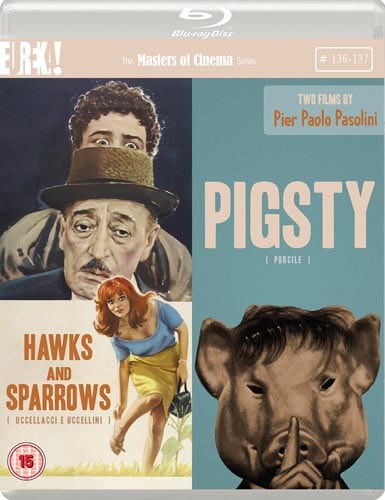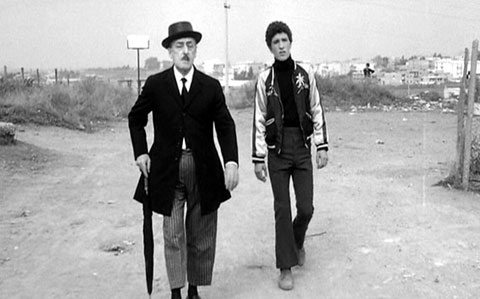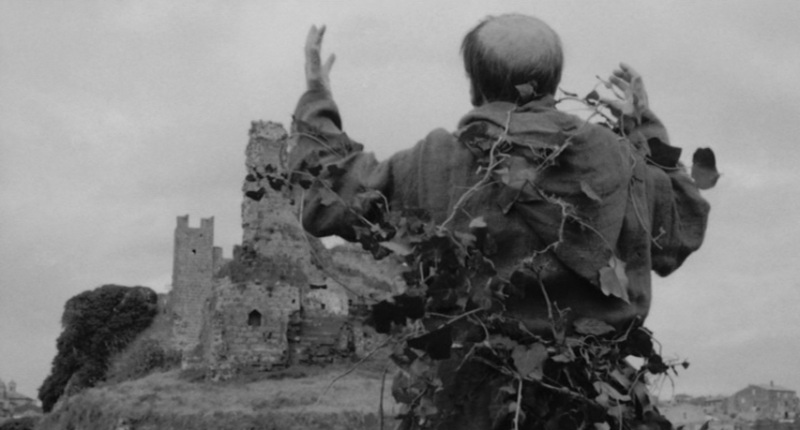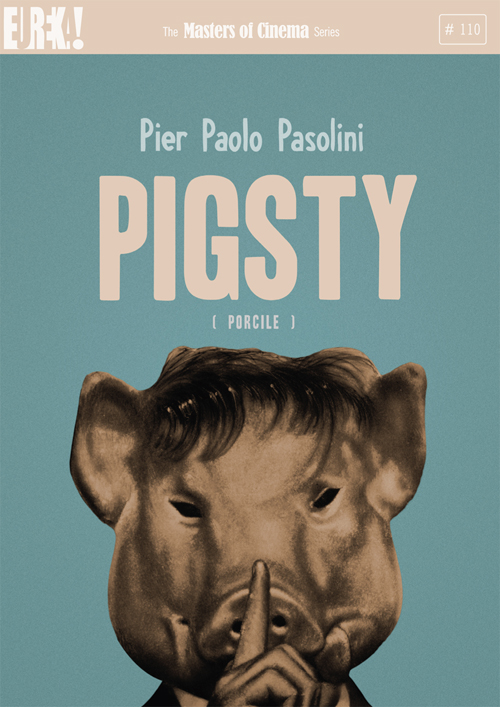Hawks And Sparrows (1966)
Directed by: Pier Paolo Pasolini
Written by: Dante Ferretti, Pier Paolo Pasolini
Starring: Femi Benussi, Ninetto Davoli, Toto, Umberto Bevilacqua
Italy
AKA UCCELLACCI E UCCELLINI
AVAILABLE ON BLU-RAY: 22nd February, from EUREKA ENTERTAINMENT, with PIGSTY
RUNNING TIME: 89 min
REVIEWED BY: Dr Lenera, Official HCF Critic
Toto and his son Ninetto roam the countryside of Rome, seemingly going nowhere in particular. Whilst jouneying down a road, they come to a restaurant. There, Ninetto joins a small group of men, then talks with some girls, one of whom is a friend of his and is dressed as a angel. Toto spots a crowd of curious people observing a house where an incident happened. They continue their journey and encounter a talking crow who follows them and starts to tell them a fable; the fable of Toto and Ninetto, who were two monks who given a special assignment by St. Francis of Assisi; to convert the hawks and sparrows to Christianity……
Pier Paolo Pasolini is one of those filmmakers I have probably read about more than I have experienced, which is a little strange as I am a huge fan of his The Gospel According To St Matthew, which probably the best film about Jesus Christ I have ever seen, and certainly found his Salo fascinating though I can’t say that I enjoyed it nor wished to see it again! Now I was actually very keen to see Hawks And Sparrows because it stars the Italian comedian Toto. I know little about him, but my favourite film of all time is Cinema Paradiso and one of Toto’s films is playing during the famous scene where Alfredo the projectionist projects the film on the wall of a house so the crowd of people outside can see it, causing the picture-house to burn down. It’s fair to say I didn’t really know what to expect with Hawks And Sparrows, which seems to be amongst Pasolini’s least talked-about films, except that it would be rather odd, have a strong political dimension and probably feature many non-actors and actresses in the background. Well, the film certainly is odd, even lurching into surrealism, but it’s also, perhaps paradoxically, a very relaxing watch, content to tell a simple allegorical story at a leisurely pace and fill it with Pasolini’s view on matters such as religion and class conflict. I’m not the kind to browse other reviews of a film I am writing up and it’s fair to say that I didn’t understand all that I was being shown. Make no mistake, this is Art House cinema with a capital A, but it’s certainly not heavy-going; in fact it has many eccentric laughs and displays a light touch throughout, right from the beginning where Toto and Ninetto talk aboutNinetto’s grandmother’s false teeth that she is hiding from grandpa!
Now normally I research an older movie before I review it so I can provide some background information, but Hawks And Sparrows is one of those movies about which there hardly seems to be any information, so I’m going to get on to the review proper. This means that this review may end up comprising of six rather than my normal seven paragraphs, but this in no way means that I didn’t find much this film interesting! Even the titles are highly original, being not only shown but sung, and towards the end the singer even wryly comments on the names being shown. We encounter Toto and Ninetto walking down their road, and they seem to be symbols of normal people, going through life without goals and perhaps even ignorant. Ninetto, a typical lusty teenager after every girl in sight, has the best of the early, seemingly unrelated scenes, especially a nice if rather odd dance sequence set to an especially groovy piece of music. Then we encounter the crow, who calls himself: “A left-wing intellectual”, and the rest of the film is comprised of roughly two halves, the first being the fable that the crow tells, the second coming back to Toto and Ninetto and the odd encounters they have on their journey to nowhere. Confusion is deliberately created by having Toto and Ninetto also be the two main monks in the story and even still be called Toto and Ninetto.
These two monks are fun to watch as they go on their mission to convert the birds, especially the way Ninetto skips along, his enthusiasm infectious if misguided. Pasolini seem to grudgingly admire religion, and the things that Toto is willing to go through to get the birds to change is oddly touching, but of course we are also being shown how Christianity throughout history has invaded other countries with its obsession of converting all and sundry. This section of the film has some truly bizarre things occurring, but somehow Pasolini just about gets us to buy things like humans talking in bird language and jumping up and down pretending to be birds. When this story ends, the rest of the film is a series of strange meetings where Toto and Ninetto even seem to change their personalities at times. They encounter a penniless family in a slum and threaten to throw them out, a weird travelling theatrical group, a prostitute and even see the funeral of Palmiro Togliatti, one of the founding members of the Italian Communist party!
The film has an odd realism about it despite its whimsy and fantastical elements. Cinematographer Tonino Delli Colli conjures up bleak and desolate but, in their own way, rather beautiful images of the Italian countryside, and of course most of the people Toto and Ninetto meet were, as the titles indicate to us, simply pulled off the street. You really get a feel of the environment and the life of Italian peasants, people who, Pasolini seems to be saying, were ignored during the political struggles during the 60’s in Italy. Pasolini is very much a Marxist, but certainly sees the flaws in the Left as well as the Right. The film seems to be saying that much well-meaning political extremism ignores the important things and that the poor get left in the shit whoever gets in charge, while the weakness of Christianity and Marxism and almost all of mankind’s ideologies is that they often properly convert those who want to be converted. Other things are rather vague and at times the film seems to be attempting to hit too many targets without giving itself enough time. I must emphasise this is a very slow moving film though; much of it consists of Toto and Ninetto just walking and talking, but you may really enjoy spending time with these two people.
Ninetto Davoli, who would become a virtual mainstay of Pasolini films, is a little awkward at times but has a relaxed charm which is very pleasing. Toto only occasionally does the comic mannerisms that [literally] brought the house down in Cinema Paradiso but is certainly a very fine actor with considerable charisma. Another strong feature of the film is Ennio Morricone’s tuneful score, with several memorable themes running the full gamut from religious to sad to dance-like. More and more, I really think he is the greatest film composer of them all, able to pull out catchy tunes at the drop of a hat yet constantly experimenting and adjusting his palette to the needs of the film, especially in the late 60’s and 70’s when he was at the peak of his powers. Hawks And Sparrows probably sounds very intellectual, but as long as you don’t expect lots of action and a fast pace I think it’s one of those films that you can enjoy even if you don’t ‘get’ it. I don’t really consider myself an intellectual, and am not sure that I ‘got’ everything at all, but found its strange spell quite soothing and some of the film just plain funny. You could say that it doesn’t really go anywhere, and I’m not sure that Toto and Alfredo learn anything by the end, but isn’t that the point?
Rating: 









The above review is a revised version of one I did for Eureka Entertainment’s DVD release of this film. The Blu-ray is undoubtedly a significant improvement over the DVD, notably in texture, so if you’re a fan of the film it’s definitely worth upgrading to, despite the lack of special features, though if you just ‘like’ it rather than ‘love’ it I would say the DVD would still be perfectly adequate.
SPECIAL FEATURES:
*High-definition transfers of both films, with uncompressed monaural soundtracks
*Optional English subtitles
*Theatrical trailers
*PLUS: A booklet featuring essays on both films by Pasquale Iannone, a 1969 interview by Oswald Stack with the director about Hawks and Sparrows; an English translation by Iannone of a 1974 interview with Pasolini discussing Totó; a 1969 note on Pigsty by Pasolini circulated at the Venice première; an extract from a 1969 interview by Gian Piero Brunetta with Pasolini; and rare archival imagery







Be the first to comment